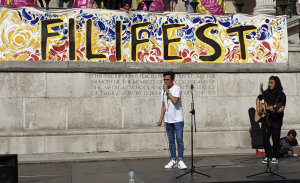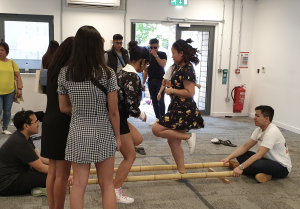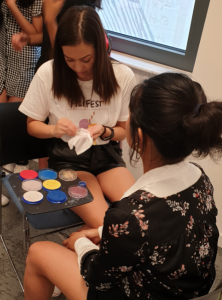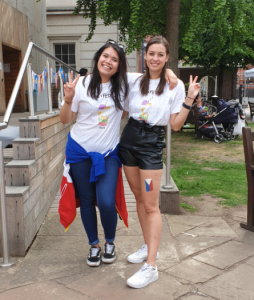Filipino Pride Transcends Generations
Jessica Rose Busante Barrett

On a rare sunny weekend in June, an event that has never been seen before took place in a university in the middle of central London. Weekends at University College London (UCL) are usually quiet, but on this day, you could hear singing, live music and excited hubbub as you approached the campus.
Last 1st of June, the space within the main quad of UCL was transformed. A hand-painted ‘FiliFest’ flag hung in front of the main building, boasting the national colours of the Philippines. A stage stood proud in the centre of the main quad, several stalls located throughout the remaining space, and hundreds of people navigated their way around each area of the festival.

This festival is the first student-run Filipino cultural event of this size to be held in the UK. Although the event was driven by the creative minds of eight students at UCL who make up the FiliFest committee, it also brought together the hard work and commitment from the Filipino Societies of universities all over the UK. The chairperson of FiliFest, Rica Go, a student at UCL, first thought about FiliFest when noticing how underrepresented Filipino’s are within the institution, despite UCL being known as ‘London’s Global University’. She dreamed of bringing people together to celebrate Filipino culture and to share this with the rest of London too, almost like a mini Barrio Fiesta, and FiliFest certainly achieved those dreams.

The day included live music and dancing from numerous talented young people of Filipino descent, traditional Filipino games, Tinikling lessons, face painting, a raffle, cultural lessons by the Philippine Embassy, and of course, food. This event was truly youth led, from the organisers, all the way to the traders, with young second-generation Filipino’s selling their food or their craft and inspiring future generations to put the Philippines on the map, popularise Filipino food and take pride in their culture.
We must not forget that this entire event was built from an idea shared between students. It was students who sourced venue locations, contacted sponsors, identified traders and performers, designed merchandise and decorations, arranged raffles, marketed the event, and much, much more. These driven young people did all of this whilst balancing their studies and even pushed through with organisation during some busy exam periods, which is a commendable feat. Despite having never organised an event of this size before, the FiliFest committee were able to learn from every challenge they faced and developed stronger relationships with each other and with the wider Filipino community.

FiliFest could not have happened without the passion and drive of the FiliFest committee and the Filipino Societies across the UK, the generosity and belief of the sponsors, the energy of the performers and volunteers, the hard work of the traders and to the many people who visited on the day. The committee are grateful to all the people involved and convey their thanks to all who believed in them.
We hear that discussions are already taking place about the future of FiliFest and the committee tell us that they have many ideas that they want to keep a surprise for you all, so keep an eye out on both their Facebook page (@FiliFestUK) and Instagram (@FiliFest) to find out more.

About the author: Jessica Barrett is a lead researcher and developer at National Collaborating Centre for Mental Health. She is a trustee for The Karira Trust and deputy group leader for regional service group within HCPT.